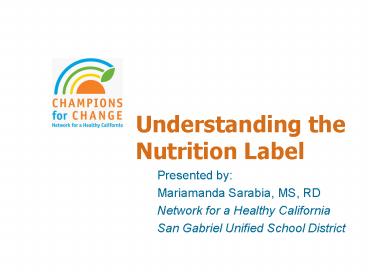Understanding the Nutrition Label - PowerPoint PPT Presentation
1 / 26
Title:
Understanding the Nutrition Label
Description:
... Garden Workshop Food Labels- LAUSD Easy Ways to Use the Label for Healthy Eating- Food and Drug Administration, ... Whatever your reason does the Nut. – PowerPoint PPT presentation
Number of Views:446
Avg rating:3.0/5.0
Title: Understanding the Nutrition Label
1
Understanding the Nutrition Label
- Presented by
- Mariamanda Sarabia, MS, RD
- Network for a Healthy California
- San Gabriel Unified School District
2
The Nutrition Facts Label
3
How Much Do You Eat?
- How much would an average person eat?
- How do these servings compare to those on the
food label?
4
(No Transcript)
5
One or Two Servings?
Single Serving Double Serving
Serving Size 1 cup (228 g) 2 cups (456g)
Calories 250 500
Calories from Fat 110 220
Cholesterol 30mg 60mg
Total Carbohydrates 31g 62g
Sugars 5g 10g
6
(No Transcript)
7
Limit These Nutrients
Go slow the goal is to stay BELOW 100 of
the Daily Value for each of these nutrients
8
Get Enough of These Nutrients
Go for These Nutrients Try to get 100 of
the DV for each of these nutrients each day
9
The Percent Daily Value
- The DV is based on 100 of the daily value
for each nutrient.
10
Daily Value (DV)
- Based on a 2,000 calorie diet
- Value is for the whole day
- Use as a tool to quickly compare products
- Low DV (fat, cholesterol, sodium)
- High DV (fiber, vitamins, minerals)
- 20 or more excellent source
- 10 - 20 good source
- 5 low
11
The Footnote
12
Quick Guide to DV
- 5 DV or less is Low
Limit these Nutrients
Get Enough of these Nutrients
20 DV or more is High
13
Sodium Recommendations
- Recommended intake for sodium is less than 2300
mg per day - 1 teaspoon of salt 2300 mg of Sodium
- Average person consumes 5,000 mg
- Average American consumes up to 75 of their
sodium from processed foods - tomato sauce soups, condiments, canned foods and
prepared mixes
14
No Daily Value
- Trans Fat
- Sugars
- Protein
15
Ingredient List
- Tells us what ingredients were used to make the
food - All ingredients must be listed
- Ingredients are listed in descending order by
weight - Those in the largest amount are listed first
16
Ingredient List
- 5 Ingredients to Limit
- Sugar
- High Fructose Corn Syrup
- Enriched Flour/White Flour
- Hydrogenated Oils (ex partially hydrogenated
soybean oil or trans fats) - Saturated fat Trans fat
17
Trans Fats
- Food labels that say 0 g of trans fat may contain
up to 0.5 g of trans fat per serving - Look at the ingredient list for hydrogenated
oils. - Switch to products that do not contain trans fat
or partially hydrogenated oil. - Aim for 0 g (or less than 2 g) of trans fat per
day
18
Sugar in Food Labels
- Foods with added sugars may provide calories, but
almost no vitamins and minerals - Look for foods and beverages low in added sugars
- Read the ingredient list, and make sure added
sugars are not one of the first few ingredients
19
The Many Names of Sugar
- Sugar
- Dextrose
- Maltose
- Syrup
- Sucrose
- Honey
- Molasses
- Fructose
- Brown sugar
- High-fructose corn syrup
20
Total Sugars
Plain Yogurt
Fruit Yogurt
21
Look for Added Sugars
22
Whole grains
- Grain products made with the entire grain
- Contain fiber
- Moves waste through the intestines
- Help provide a feeling of fullness
- May reduce blood cholesterol levels
- May lower risk of heart disease
23
Spotting Whole Grains
- Some products contain small amounts of whole
grain which do not provide a significant amount
of fiber - Products made with large amounts of whole grains
list whole grain as the first ingredient. - 5g of fiber per serving is high
24
Is Your Food a Healthy Choice?
- Use your food label to fill in the chart and
answer the following questions - Type of food and brand name
- What are the first four ingredients listed?
25
For More Information visitwww.cfsan.fda.gov/dm
s/lab-gen.html
26
Acknowledgements
- Adapted from
- Garden Workshop Food Labels- LAUSD
- Easy Ways to Use the Label for Healthy Eating-
Food and Drug Administration, Center for Food
Safety and Applied Nutrition, Office of
Nutritional Products, Labeling, and Dietary
Supplements.































